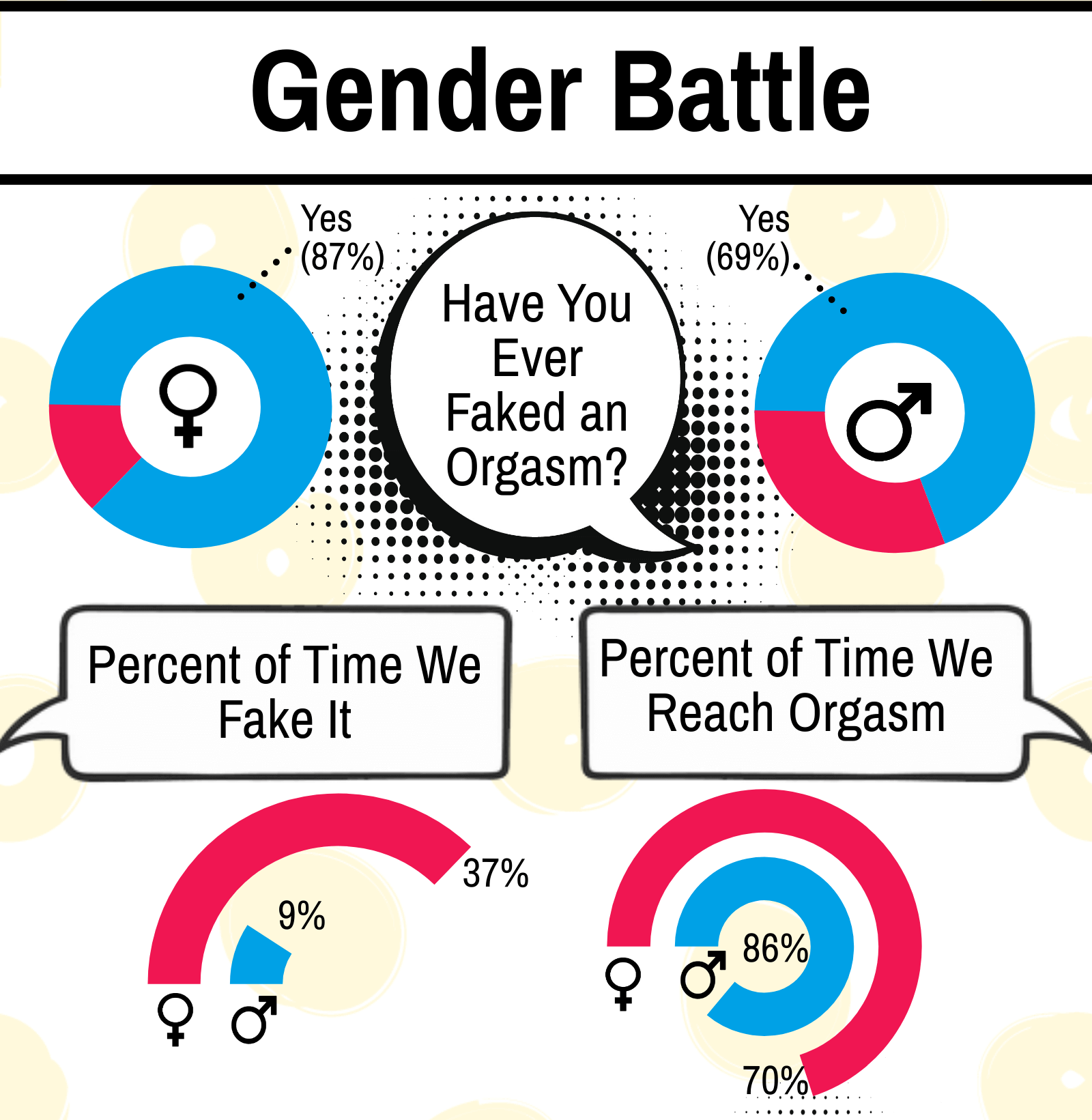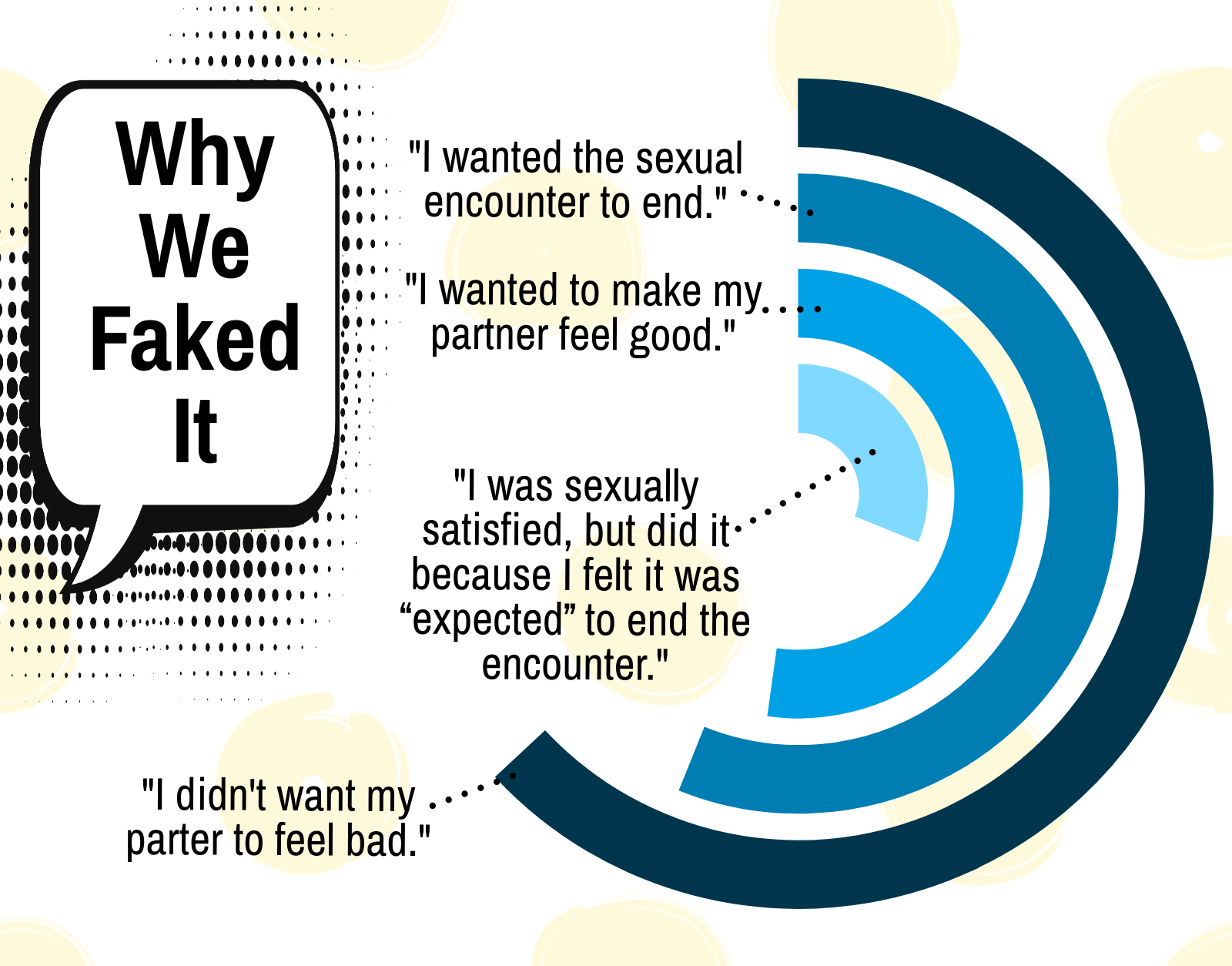Why Are So Many People Faking Orgasms?
Kinkly survey reveals need for better sex ed and communication among adults.

While the media is becoming more sexually accepting and reporting more and more on advancements in sex tech, it’s disconcerting to learn that many people still have a hard time fully embracing their sexuality.
This contradiction is well demonstrated by findings from a recent survey conducted by the sex education site Kinkly. It revealed that a remarkably high percentage of respondents reported faking orgasms: a staggering 80%.
The high number is worrisome on its own. But it becomes even more troubling when we consider why people are pretending to climax and what this says about the current emotional state of so many toward sex.
Even worse, there’s the possibility that unless something is done to address unrealistic and potentially damaging attitudes, that they will ferment and become more toxic in the years to come.

Behind the survey
Kinkly is a well-regarded sexual education resource site with a definite kink bend. It was founded by two Canadian women “who had plenty of sex-related questions–but found the online space short on answers, especially when it came to things like kink, sex toys, and content that explored sex and sexuality from all angles.”
Their answer to this was to create Kinkly, which since its inception has become packed with all kinds of informative articles, sex toy reviews, interviews, resources, and more.
Survey says

Kinkly’s latest survey collected responses from 1,232 readers, who were asked the number of times they had faked an orgasm and why.
Demographically, while the site did receive some answers from people who were agender or trans-identified, the number was too low for them to have a good representation. As a result, the survey analysis only drew conclusions based on those who identified as male or female.
The answers, as we’ve already said, were pretty alarming, with 80% saying they’d faked an orgasm at least once in their sexual lives. In addition, the breakdown or orgasms fakers based on gender is extremely skewed.
According to the Kinky survey finding:
Respondents who identify as men only fake orgasms 9% of the time, but those who identify as women reported that they fake orgasms 37% of the time. So, even though 69% of males said that they have faked at least one orgasm, it’s clear that the 87% of females that fake orgasms are doing it a lot more often than the males.
There’s also a dramatic shift in frequency based on age. For women, they reported faking orgasms less frequently after 34, while men admitted increasing their own number as they got older.

The good news is that 97% of respondents said they experience orgasms with a partner and/or on their own. However, this positive slant is seriously tempered by men who said they reached climax 80% of the time (with or without a partner) while women only did so 70% of the time.
The why behind faking it
While these numbers are troubling, it’s nothing compared to the reasoning behind why so many sexually active adults feel the need to fake their orgasms.
Kinkly breaks the responses down into four categories. The most prevalent response was “I didn’t want my partner to feel bad.”
On the surface, this seems altruistic: that the surveyed felt some concern about their partner’s feelings.
But do some thinking and it reveals the persistence of some almost-tragical myths around sex — mainly that achieving orgasm is the driving factor behind sexual activity, and that not having one somehow means the sex wasn’t “successful.”

Worse, that orgasms can somehow be given: the result of “effective” sexual activity, when the reality is that while partners can certainly help, achieving orgasm is still very much within the body, and mind, of the one having them.
The next reason for faking it was even more sobering: “I wanted the sexual activity to end.”
Let’s let that sink in a bit: rather than feeling empowered to end what was unsatisfactory, for whatever reason, these people felt safer faking their pleasure. That this is viewed as a “safe” means of fleeing an unwanted situation says far too much about poor sexual agency and a lack of productive public discourse concerning sexual education, communication, and consent.
The third reason for faking it: “I wanted my partner to feel good,” Since this is pretty much the flip side of “I didn’t want my partner to feel bad.”
The last reason for faking it had to do with preconceptions on what so-called “normal” sex is supposed to look like: “I was sexually satisfied, but did it because I felt it was ‘expected’ to end the encounter.”
This answer is another alarming sign that we still have so much to learn about sex. Here, yet again, many people said that sex is all about the orgasm, and that not having one somehow makes the experience less than satisfactory.
Disquieting results
Even though the answers are a wake-up call, there are many reasons for hope.
For one, it shows that sites like Kinkly, as well as us here at Future of Sex, aren’t just a good idea but have become invaluable tools in the fight against sexual ignorance.
Two, we’re talking about this: things can’t progress unless we address these negative ideas that some many still have around orgasms and sex.
Because of this, we heartily applaud Kinkly for shedding light on not just how many people fake their orgasms, but also seeking the reasons behind it.
As Kinkly’s survey concludes:
So, how can we solve this? Well, for starters, we can simply not be shitty people. By that we mean, we need to stop judging one another—and ourselves.
Sex has this magnificently terrible ability to bring out our worst thoughts about ourselves, which really isn’t all that surprising. During sex, you’re open and vulnerable, both physically and emotionally. It’s so easy for those negative thoughts to come creeping in.
One of the ways we can work toward solving these issues is by learning how to communicate during sex. Communication is key in any relationship, including sexual ones!
With that very much in mind, we also encourage our readers to share sexual needs, desires, and concerns.
Listen completely and with respect to your sexual partners. Be honest with yourself about your sexual needs and only accept partners who will listen to you.
Finally, understand that sex is not a goal but can be a delightfully wonderful journey of joy and self-exploration.
Image sources Kinkly
Leave a reply
You must be logged in to post a comment.

















